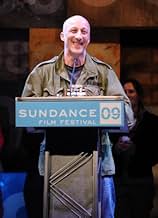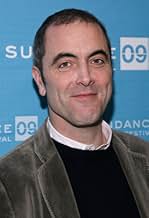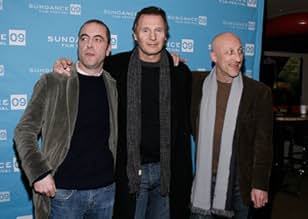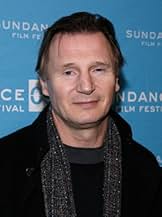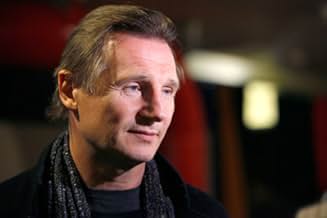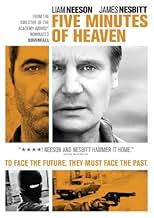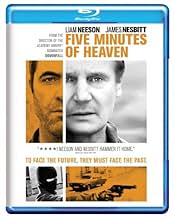La storia dell'ex membro delle forze lealiste dell'Irlanda del nord Alistair Little. Venticinque anni dopo che Little ha ucciso il fratello di Joe Griffin, i media organizzano un incontro ch... Leggi tuttoLa storia dell'ex membro delle forze lealiste dell'Irlanda del nord Alistair Little. Venticinque anni dopo che Little ha ucciso il fratello di Joe Griffin, i media organizzano un incontro che sia di buon auspicio tra i due.La storia dell'ex membro delle forze lealiste dell'Irlanda del nord Alistair Little. Venticinque anni dopo che Little ha ucciso il fratello di Joe Griffin, i media organizzano un incontro che sia di buon auspicio tra i due.
- Ha vinto 1 BAFTA Award
- 10 vittorie e 12 candidature totali
- Young Alistair Little - 1975
- (as Mark Davison)
Recensioni in evidenza
A part not to be overlooked is played by Anamaria Marinca (Vika), a 'gopher' for the film crew. Her character added quite a bit of depth to the film. Neeson and Nesbitt should both be recognized for their riveting performances.
In most films today the focus is on revenge, blood, and murder. "Five Minutes.." includes these vices but, contrary to the blood and gore in many movies today, this film's focal points are, indeed, letting go, finding your life and living it, focusing on what means most to you, demolishing the demons that haunt you, and, most importantly, discovering that elusive human effort which leads to forgiveness. It's hard...very hard, and most of us can't bring ourselves to that end because forgiveness is many times viewed by society as weakness when it is, in actuality, strength.
I have a confession--when the movie started I thought, okay, another pro-IRA movie with a heart. And it's not--it's a beautifully balanced movie about the personal horrors of the Northern Ireland bloodshed and the longterm aftermath as participants struggle to keep going.
The two main actors are both from Northern Ireland. Liam Neeson plays a Protestant who as a teenage killed a Catholic worker as part of the tit-for-tat violence of the time. James Nesbitt, a Roman Catholic, plays the brother of the man who was killed, and as a witness to the crime he holds a deep grudge about the murder. And in a key act of political insight, the actors were born on the opposite sides--Neeson was raised Catholic and Nesbitt raised Protestant.
The theme of the film is reconciliation in the mold of South African leader Nelson Mandela. The core of the movie is shot in a fancy Irish mansion where television crews are going to watch as the two men, mortal enemies decades before, make an effort to somehow move on, in public, on t.v.
How it goes is for you to see. The murder in the 1970s is fact, easy enough to believe, and the meeting of the men is fiction. Nesbitt is utterly terrific. You might think he's overacting (he is, of course, overacting) but it's appropriate, and gives this non-action film some intensity. Neeson is strong in his restraint and in the one main scene where he gives a well-written speech about how to understand these horrors he is also terrific.
The filming is extremely simple and in fact the whole scenario is relatively linear, even with all the flashbacks. There are some turns to the events by the last half hour, and in a way this is both the dramatic high and the disappointing low of the film (it resorts to somewhat corny and not quite smartly filmed sequences I won't elaborate). But overall the point is so strong and well meant it's hard to worry too much about whether it's a masterpiece.
It's not. It's sometimes slow, it says stuff we probably have absorbed pretty well by now, and it isn't very complex. But what it does do it does with compassion and conviction.
Because, as highlighted in this film, the question of forgiveness is not about erasing or escaping from the past but rather embracing it and find where the things left behind from the past, doesn't matter whether they were sweet or sour, fits to help bring out the most in life. The acting performances by both lead roles are commendable.
This film is a fiction inspired by two men who bear the legacy of one of those killings.......
That is the opening salvo from the makers of Five Minutes of Heaven, I would personally like to add, since no other reviewer here has said it thus far, that the two protagonists never met in real life.
Five Minutes of Heaven was first screened at the Sundance festival in 2009 and won awards for Directing {Oliver Hirschbiegel} and for screen writing {Guy Hibbert}. It stars Liam Neeson as Alistair Little and James Nesbitt as Joe Griffen. The story is about how a young wannabe hero of the Ulster Volunteer Force {Little} gunned down the brother of Joe Griffen {Nesbitt}, purely because he was of Catholic religion, all witnessed by young soccer ball kicking Joe out on the pavement in front of the Griffen house. After the build up and execution of the crime, we forward to the future after Little has served 12 years prison for the murder, and here we now have a television company led meeting between the two after the Good Friday Peace Agreement.
It's only now that the film really kicks in as a powerful piece that has something to say. Too many third rate productions caricature their characters in films involving the British/Irish troubles, but the makers here are keen to avoid that-hence the appearance of Neeson, who wouldn't have come cheap one feels. Both Nesbitt {ranking along side George Best as most talented thing to come out of Northern Ireland} and Neeson then shift gears to ram home the point of the story. This is about forgiveness, pertinent questions about if that is possible under the most trying of circumstances. Would you be able to move on? And at what cost? Both sides of the coin are deftly rubbed by Hirschbiegel and his terrific cast.
It would be stupid of me to not say the piece has problems since it clearly isn't perfect. Both sides of the families involved are not formed at all, and that is without a doubt a very big misstep. Probably a victim of course of the TV movie production value and the sadly inept running time afforded it. But that annoyance aside, and in the context of the final product.....well it works out rather well I feel. There's some smart points of reference in there, note the young Little handling his gun amongst a sea of childhood toys, while there's a dolly out shot involving a church that nails that particular scene with maximum poignancy. But really, as is normally the way in this type of production, it lives or dies by its ending, and the question is answered as to if the actors involved have involved us enough to actually carry it off?
We are OK here, because we got Nesbitt and Neeson, point made, acted accordingly, yep, see this if you can. 8/10
Lo sapevi?
- QuizLiam Neeson was raised a Catholic and portrays a Protestant. James Nesbitt was raised a Protestant and portrays a Catholic.
- BlooperLittle's photograph of Griffin's family changes between shots. In some scenes it has a border and in others it doesn't.
- Citazioni
Alistair Little: [talking to TV camera] For me to talk about the man I have become, you need to know about the man I was. I was 14 when I joined the Tartan gangs and I was 15 when I joined the UVF. At that time, don't forget, there were riots on the streets every week; petrol bombs everyday, and that was just in our town. When you got home and switched on the TV, you could see what was happening in every other town as well, and it was like we were under siege. Fathers and brothers and friends were being killed in the streets, and the feeling was, we all have to do somethin'. We're all in this together and we all have to do somethin'.
Alistair Little: The thing you have to remember, what you have to understand, is the mindset. Once you have signed up to terror, and joined the organization - the group - your mind closes right down. It becomes only *our* story that matters, not their story - the Catholics. It's only *my* people that are being killed, and here suffering and that need looking after. Catholics being killed? Doesn't enter your head. And so when I went up to Sammy, our local commander, and told him I wanted to kill a Catholic man, it wasn't a wrong thing for me to do. In my head, it was the proper, the just, the fair, the good thing to do. And so, it was easy.
Alistair Little: When I got to the house, there was a boy in the street. I didn't expect him to be there, but, there he was. I only looked at him for a moment because I had a job to do, but if I had known that he was Jim's brother, I would have shot him as well. It was in the mindset. It was tit-for-tat, and perhaps one more - why not? That's what it was like. I was only 17. I'd seen my people fighting ever since I was a wee boy. You'd take sides with your friends as a boy, but we weren't just throwing stones over the fence, we were shooting guns. What I want to tell people - what society must do - is to stop people getting to the point where they join the group. Because when you get to that point it's too late. No-one's gonna stop you. No-one's gonna change your mind. And once you're in, you will do anything. You will kill anyone on the other side, because it's right to do it. Once your man has joined the group, society has lost him. And what he needs to hear are voices on his own side, stopping him before he goes in. There were no voices on my side, not on my side of the town, not in my state. No-one was telling me anything other than that killing is right. It was only in prison when I heard that other voice. And the Muslims now, you know the kids now are like I was then. They need to hear those voices now, stopping them from thinking that killing is good. They need *their own* people to say "no". That's where they need to hear it, and that's where I would put my money - on making those voices heard in every mosque in the country.
Alistair Little: When I got home, my mother and father were watching the TV, and it came on the news that the man I had shot was dead. I was so excited, I couldn't wait for when I would get my congratulations. Sammy was going to come knocking at my door, he was going to lead me out into the street and proudly walk me into the bar, and everybody was gonna stand up and applaud. Me? I would've shot anyone for that. And that is why I talk to anybody who would listen now, to tell them to stop boys like me thinking that to shoot an innocent, and a decent man in the head, is a good thing.
- ConnessioniFeatured in WatchMojo: Top 10 Liam Neeson Performances (2012)
- Colonne sonoreA Glass of Champagne
Written by Georg Kajanus
Performed by Sailor
Courtesy of Sony BMG Records
Under license by Sashay Music & Warner Chappell Music Publishing
I più visti
Dettagli
- Data di uscita
- Paesi di origine
- Lingua
- Celebre anche come
- Five Minutes of Heaven
- Luoghi delle riprese
- Aziende produttrici
- Vedi altri crediti dell’azienda su IMDbPro
Botteghino
- Lordo Stati Uniti e Canada
- 15.676 USD
- Fine settimana di apertura Stati Uniti e Canada
- 5364 USD
- 23 ago 2009
- Lordo in tutto il mondo
- 364.355 USD
- Tempo di esecuzione1 ora 29 minuti
- Colore
- Mix di suoni
- Proporzioni
- 1.85 : 1
Contribuisci a questa pagina




